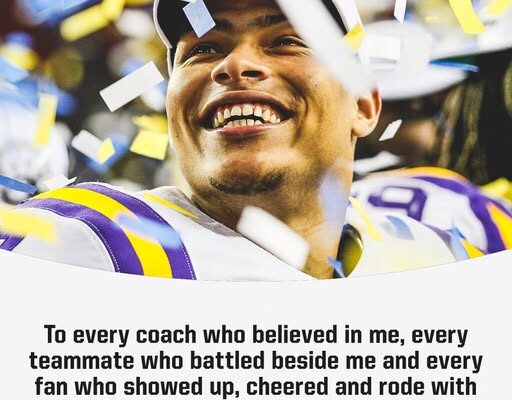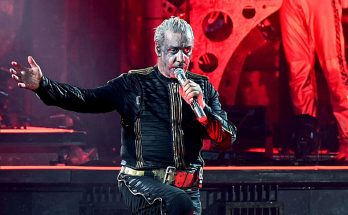He got his, and there will only ever be one Honey Badger.
In the world of sports, particularly in football, nicknames aren’t given—they’re earned. They’re forged through grit, through pain, through fire and brilliance. They come when a player does something that can’t be forgotten, something that sets him apart not just in the record books, but in the minds of those who watched. Tyrann Mathieu didn’t just earn a nickname—he embodied it. The “Honey Badger” wasn’t some cute moniker slapped onto a talented player. It was a reflection of his spirit, his relentlessness, his refusal to back down. It was everything he was, on every snap, in every game, from college through the NFL. And now, with a Super Bowl ring and a legacy few can match, we say it proudly: He got his. And there will only ever be one Honey Badger.
It all started at LSU, where the world was first introduced to Tyrann Mathieu’s unique brand of controlled chaos. He wasn’t the biggest. He wasn’t the fastest. But he made plays—over and over again—like the game was something personal. Whether it was punching a ball loose, leaping into passing lanes, or screaming off the edge for a sack, Mathieu did it all. He was the heartbeat of that fearsome LSU defense, a unit already stacked with NFL-caliber talent. But it was the Honey Badger that stole the show. He was everywhere—causing turnovers, flipping the momentum, putting fear into quarterbacks and coordinators alike.
But with brilliance often comes the burden of expectation and scrutiny. Tyrann’s journey was not without struggle. His time at LSU was cut short. Off-field issues led to his dismissal from the team, and just like that, the rising star was cast into darkness. The media pounced. Pundits wrote him off. Some called him a wasted talent. Others said he’d never make it in the NFL, that the league would chew him up and spit him out. But that’s the thing about honey badgers: they don’t die easy. They fight.
Mathieu didn’t hide. He owned his mistakes. He put in the work, got help, and stayed focused. The Arizona Cardinals saw what he could be—not just who he was—and gave him a shot in the 2013 NFL Draft, taking him in the third round. It was a gamble for some, a no-brainer for others. For Tyrann, it was a lifeline. And he didn’t waste it.
From the moment he stepped onto an NFL field, he proved he belonged. He played with the same tenacity, the same controlled recklessness that had defined him in college, but now with the poise of a professional who had been humbled, who had been told he wasn’t enough and was determined to prove them wrong. He became a key piece in Arizona’s defense, a roving defender who could line up anywhere—slot corner, safety, outside, even linebacker in some packages. He was the Swiss Army knife of the secondary, and he attacked every down with fury.
Injuries tried to derail him. A torn ACL here. Another knee injury there. Each time he was knocked down, he clawed back. He never gave up. Each rehab, each training camp, each new season was a chance to prove again that he was still the same Honey Badger—that he still had that fire. And each time, he roared louder.
When his time in Arizona ended, he bounced to Houston for a season, continuing to lead and make plays, before landing in Kansas City. And that’s where it all came together. That’s where legacy crystallized.
Kansas City had been looking for a defensive anchor, a leader in the back end who could not only direct traffic but also set the tone. They found that in Mathieu. He wasn’t just a safety. He was a force of nature. Quarterbacks had to account for him on every snap. Coaches schemed away from him. And still, he made plays—timely interceptions, key pass breakups, emotional energy that galvanized the entire defense. He was named a team captain and quickly became one of the emotional leaders of a team poised for greatness.
And then came the moment.
Super Bowl LIV. Kansas City Chiefs versus the San Francisco 49ers. The stage was set. And while it was Patrick Mahomes and the high-flying offense that drew headlines, it was the defense—led vocally and spiritually by Mathieu—that kept the Chiefs in the game when things got tough. Down double digits, many teams would have folded. Not this one. Not with the Honey Badger pacing the sideline, barking encouragement, challenging his teammates to dig deep. The comeback was legendary. The confetti fell. The ring was earned.
For a kid once told he wouldn’t last, for a player dismissed and doubted, for the man who fought through the worst moments of his life and came out sharper, better, wiser—this was vindication. This was proof. He wasn’t just a flash in the pan, not just a college highlight reel. He was a champion. He was a leader. He was everything the Honey Badger name promised.
But it wasn’t just about football. Mathieu used his platform to give back, to be a voice for others who were facing their own battles. He mentored younger players. He spoke openly about mental health, about second chances, about responsibility. He never pretended to be perfect, but he showed what redemption looked like. He became more than an athlete—he became a symbol of perseverance.
You can teach technique. You can train for speed, lift for strength, practice for precision. But you can’t teach what Tyrann had in his heart. That thing that makes a player dive into a pile of giants just to knock a ball loose. That thing that makes him stand up after tearing a ligament and still believe he’s not done. That thing that makes him bark at his teammates not to show off, but because he believes they can be better. That’s what made him different. That’s why there will only ever be one Honey Badger.
We’ve seen great safeties—Ed Reed, Troy Polamalu, Brian Dawkins, legends of the game. Mathieu carved his name among them in a different way. He didn’t always have the prototypical size or 40-time. But he had instincts that were almost unnatural. He saw plays before they happened. He had the swagger, the fearlessness, the heart of a lion in the body of an underdog. When others saw limits, he saw opportunity. When others hesitated, he attacked. His highlight reel isn’t just impressive—it’s a lesson in playing with passion.
And now, as his career winds down and the next generation steps in, they’ll all try to take something from his game. Maybe it’s the aggression. Maybe the versatility. Maybe the leadership. But none of them will fully be him. Because the Honey Badger wasn’t a mold to copy. He was one of one. He was born of a very specific time, a very specific struggle, and rose because of it—not in spite of it.
You can’t replicate what came from pain. From being cast aside. From sleeping on floors, training in silence, doubting yourself and then choosing to believe anyway. Tyrann didn’t have an easy road. But he made it beautiful. He made it unforgettable.
Even now, when fans look back at the greatest defenders of the era, his name might not always come up first—but for those who watched, really watched, they’ll remember what he did. How he changed games. How he flew across the field like he had a jetpack strapped to his back. How he took on linemen twice his size and never blinked. How he treated every down like it was the most important of his life.
And for the kids watching today, wondering if they’re too small, if they’ve made too many mistakes, if they’ll ever get another shot—his story is proof. Not everyone gets it right the first time. Not everyone walks a straight path. But if you’ve got heart, and you’re willing to fight, you can write your own ending.
Tyrann Mathieu’s career isn’t just about stats and rings, though they help tell the story. It’s about impact. It’s about redemption. It’s about legacy. He’ll go down as one of the most inspiring players the game has ever seen. And whether he ends up in Canton or not, he’s already in the Hall of Fame that matters—the one in the hearts of fans who saw him not just for what he did, but for what he represented.



